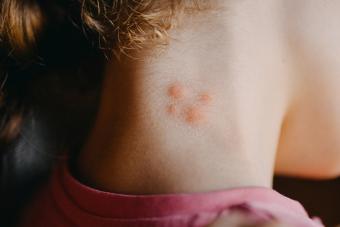
Excessively thick dry skin on feet and hands is a bummer in winter, when cold and dry air can lead to chapping and cracking. In summer, when feet are on display in sandals, it's downright embarrassing.
Rule Out a Medical Reason
When moisturizer isn't enough, there may be a medical reason for unusually dry skin. Some common, drying conditions are:
- Eczema. Eczema, also called atopic dermatitis, is an itchy rash. It's more common on hands than on feet and can appear just about anywhere else on the body, too. Scratching the itch causes skin to become inflamed and, over time, to thicken. The skin can become so dry that it cracks, leading to deep, painful fissures. Severe eczema is treated with prescription creams.
- Psoriasis. Psoriasis is a skin condition that leads to dry, scaly skin. The rash has a characteristic whitish, silvery color. A combination of prescription and over-the-counter treatments can help.
- Thyroid problems. An underactive thyroid can cause skin to become excessively dry. Other symptoms include dull hair, fatigue, and constipation. Thyroid problems require a doctor's care.
Check Your Routine
Healthy skin doesn't require tons of attention, but it does need a little love. Make sure you're not being too harsh on your hands and feet.
- Scrutinize your soap dish. Antibacterial soaps, which are tough on germs, can be almost as hard on your skin. Inexpensive hand and bath soaps can be harsh and drying.
- Analyze the air. Both heat and air-conditioning artificially dry the air. Dry air can suck moisture out of your skin.
- Watch the weather. Depending on what part of the country you're in, either summer or winter may be the driest time. Hot desert weather and cold, windy winter will both contribute to dry, thickened skin on feet and hands.
- Think about your job. Do you work with your hands? Are you around cleaning fluids or chemicals? These things can give you irritant or contact dermatitis, both of which cause dry, thickened, irritated skin.
Change Your Habits
If your daily routine is drying out your skin, try these simple solutions:
- Switch to a moisturizing soap or a non-soap cleanser. Dermatologists often recommend Dove, Cetaphil, and other gentle cleansers.
- Invest in a humidifier. If the air in your home is dry, add back some moisture with a good-quality humidifier.
- Protect against the elements. During your area's dry season, make it a routine to moisturize hands and feet before going outside.
- Wear protective gloves. If you must work with chemicals or cleaners, be diligent about wearing gloves. Forgetting even once can lead to days of itchy, irritated hands.
Dry, Dry, Dry Feet
Excessively thick dry skin on feet can be especially hard to combat. Everyday walking leads to callused soles. As shoes rub on the sides of feet and toes, more thickened areas form. Getting this dry skin under control requires daily vigilance.
- Use a pumice stone. Gently rubbing the thickened areas with a pumice stone after showering or bathing will help skin feel smoother and softer. Don't overdo it, though: you can't make all the thick skin go away at once.
- Be generous with lotion. Smooth on a rich moisturizer after each shower or bath. At night, use lotion or Vaseline, then pull on a pair of cotton socks to keep the cream from rubbing away on your sheets.
- Look for moisturizers with AHA or lactic acid. Alpha-hydroxy acids help dissolve dead skin cells. Daily use can smooth dry, thickened skin. (Some people's skin is too sensitive for AHA cream; stop using it if irritation develops.)
- Try a foot soak. Fill a basin with warm water, add some Epsom salts, and relax while your feet absorb moisture. Afterward, use your pumice stone and then massage in some moisturizer.
- Don't slice or shave! Cutting away corns and calluses should be left to a doctor or podiatrist.
Podiatrists Can Help
If your feet are so dry that large cracks have formed, consider a visit to a podiatrist. He or she can remove some of the thickened skin to help speed healing. You can have this done during a pedicure, too, but doctors don't recommend it. It's too hard to make sure that the tools are sterile, and pedicurists aren't medically trained.
Preventing Excessively Thick Dry Skin on Feet and Hands
Once your hands and feet are looking better, continue the same routine that got them there. Keep moisturizer handy, protect your skin from dry air, and stay away from harsh soaps and chemicals. If skin becomes irritated, or if dry skin continues in spite of your efforts, check with a dermatologist.







